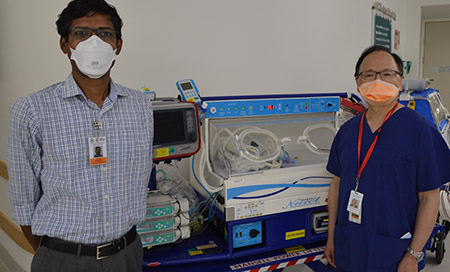Common eye condition in neonatal babies predicted by weight gain
 Dr Sam Athikarisamy and Professor Geoffrey Lam in front of a NETS transport cot
Dr Sam Athikarisamy and Professor Geoffrey Lam in front of a NETS transport cot
A joint neonatology and ophthalmology research project has found a simple method, based on a post-natal weight gain model, can predict a common eye condition in premature babies.
The finding, which evaluated the performance of algorithms, provides strong evidence for reviewing the screening protocols for retinopathy of prematurity (ROP) which is the leading cause of blindness in premature babies.
The findings could have a huge impact globally by reducing the number of premature babies who are screened for ROP.
Neonatologist Dr Sam Athikarisamy and Ophthalmologist Clinical Associate Professor Geoffrey Lam published their systematic review and meta-analysis of 61 studies in the JAMA Network Open Journal.
Dr Athikarisamy said current screening protocols for ROP require frequent retinal examinations which creates enormous workload for staff in neonatal intensive care units.
"A ROP screening program is essential because identification and treatment is key to reducing the risk of blindness.
"We found the weight gain-based algorithm proved effective in identifying which babies were at risk of developing ROP.
'More targeted screening is a cost and time effective measure for staff but will also reduce the number of babies who experience the discomfort of an examination," Dr Athikarisamy said.
All babies born at less than 31 weeks are screened for ROP in neonatal units in WA and fewer than 1 in 1,000 babies develop blindness.
"While the incidence of blindness caused by ROP is rare in WA, we see the incidence increasing globally," Dr Athikarisamy said.
Dr Athikarisamy said he hoped the findings could help prompt a review of screening protocols for ROP internationally to ensure resources were better directed to the babies most at risk.
The paper was co-authored by Dr Samuil Desai, Professor Sanjay Patole, Clinical Associate Professor Shripada Rao and Professor Karen Simmer.
Read the article - The Use of Postnatal Weight Gain Algorithms to Predict Severe or Type 1 Retinopathy of Prematurity: A Systematic Review and Meta-analysis - PubMed (nih.gov).

